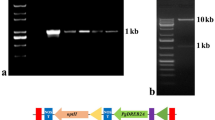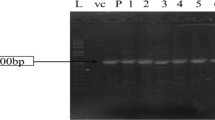Abstract
One of the critical alarming constraints for agriculture is water scarcity. In the current scenario, global warming due to climate change and unpredictable rainfall, drought is going to be a master player and possess a big threat to stagnating gene pool of staple food crops. So it is necessary to understand the mechanisms that enable the plants to cope with drought stress. In this study, effort was made to prospect the role of EcDehydrin7 protein from normalized cDNA library of drought tolerance finger millet in transgenic tobacco. Biochemical and molecular analyses of T0 transgenic plants were done for stress tolerance. Leaf disc assay, seed germination test, dehydration assay, and chlorophyll estimation showed EcDehydrin7 protein directly link to drought tolerance. Northern and qRT PCR analyses shows relatively high expression of EcDehydrin7 protein compare to wild type. T0 transgenic lines EcDehydrin7(11) and EcDehydrin7(15) shows superior expression among all lines under study. In summary, all results suggest that EcDehydrin7 protein has a remarkable role in drought tolerance and may be used for sustainable crop breeding program in other food crops.




Similar content being viewed by others
References
Tenywa, J. S., Nyende, P., Kidoido, M., Kasenge, V., Oryokot, J., & Mbowa, S. (1999). Prospects and constraints of finger millet production in Eastern Uganda. African Crop Science Journal, 7, 569–583.
Tadele, Z. (2007). Role of orphan crops in enhancing and diversifying food production in Africa. African Technology Development Forum - Journal, 6, 9–15.
Rahman, H., Jagadeeshselvam, N., Valarmathi, R., Sachin, B., Sasikala, R., Senthil, N., Sudhakar, D., Robin, S., & Muthurajan, R. (2014). Transcriptome analysis of salinity responsiveness in contrasting genotypes of finger millet (Eleusine coracana L.) through RNA-sequencing. Plant Molecular Biology, 85, 485–503.
Solomon, S. (ed). (2007). Climate change 2007—the physical science basis: Working group I contribution to the fourth assessment report of the IPCC (Vol. 4). Cambridge University Press.
IPCC special report on carbon dioxide capture and storage, Chap. 5. http://www.ipcc.ch/pdf/special-reports/srccs/srccs_wholereport.pdf. Accessed 14 October 2008.
Mittler, R., & Blumwald, E. (2010). Genetic engineering for modern agriculture: challenges and perspectives. Annual Review of Plant Biology, 61, 443–462.
Boyer, J. S. (1982). Plant productivity and environment. Science, 218, 443–448.
Bray, E. A., Bailey-Serres, J., & Weretilnyk, E. (2000). Responses to abiotic stress. In B. B. Buchanan, W. Gruissem, & R. L. Jones (Eds.), Biochemistry and Molecular Biology of Plants (pp. 1158–1203). Waldorf: American Society of Plant Biologists.
de Carvalho, M. H. C. (2008). Drought stress and reactive oxygen species. Plant Signal Behavior, 3, 156–165.
Singh, R. K., Phanindra, M. L. V., Singh, V. K., Sonam, R. S., Solanke, A. U., & Kumar, P. A. (2014). Isolation and characterization of drought responsive EcDehydrin7 gene from finger millet (Eleusine coracana (L.) Gaertn.). Indian Journal of Genetics and Plant Breeding, 74, 456–462.
Tamura, K., Stecher, G., Peterson, D., Filipski, A., & Kumar, S. (2013). MEGA6: molecular evolutionary genetics analysis version 6.0. Molecular Biology and Evolution, 30, 2725–2729.
Horsch, R. B., Fry, J. E., Hoffmann, N. L., Eichholtz, D., Rogers, S. A., & Fraley, R. T. (1985). A simple and general method for transferring genes into plants. Science, 227, 1229–1231.
Arnon, D. I. (1949). Copper enzymes in isolated chloroplasts. Polyphenoloxidase in Beta vulgaris. Plant Physiology, 24, 1–15.
Mundy, J., & Chua, N. H. (1988). Abscisic acid and water-stress induce the expression of a novel rice gene. EMBO Journal, 7, 2279–2286.
Dure, L. S. (1993). Structural motifs in LEA proteins. In E. A. Bray, & T. J. Close (Eds.), Plant responses to cellular dehydration during environmental stress (pp. 91–103). Rockville: The American Society of Plant Physiologist.
Close, T. J., Kortt, A. A., & Chandler, P. M. (1989). A cDNA-based comparison of dehydration-induced proteins (dehydrins) in barley and corn. Plant Molecular Biology, 13, 95–108.
Acknowledgments
The authors are thankful to the Department of Biotechnology (DBT), Govt. of India, and Indian Council of Agricultural Research (ICAR) for financial assistance; and AICP on small millets, University of Agricultural Sciences, Bangalore, for providing seeds of finger millet.
Author information
Authors and Affiliations
Corresponding authors
Rights and permissions
About this article
Cite this article
Singh, R.K., Singh, V.K., Raghavendrarao, S. et al. Expression of Finger Millet EcDehydrin7 in Transgenic Tobacco Confers Tolerance to Drought Stress. Appl Biochem Biotechnol 177, 207–216 (2015). https://doi.org/10.1007/s12010-015-1738-4
Received:
Accepted:
Published:
Issue Date:
DOI: https://doi.org/10.1007/s12010-015-1738-4




